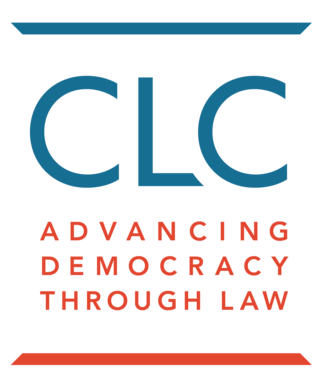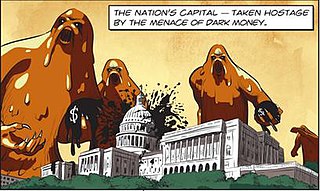Related Research Articles

Campaign finance laws in the United States have been a contentious political issue since the early days of the union. The most recent major federal law affecting campaign finance was the Bipartisan Campaign Reform Act (BCRA) of 2002, also known as "McCain-Feingold". Key provisions of the law prohibited unregulated contributions to national political parties and limited the use of corporate and union money to fund ads discussing political issues within 60 days of a general election or 30 days of a primary election; However, provisions of BCRA limiting corporate and union expenditures for issue advertising were overturned by the Supreme Court in Federal Election Commission v. Wisconsin Right to Life.
In the United States, a political action committee (PAC) is a tax-exempt 527 organization that pools campaign contributions from members and donates those funds to campaigns for or against candidates, ballot initiatives, or legislation. The legal term PAC was created in pursuit of campaign finance reform in the United States. Democracies of other countries use different terms for the units of campaign spending or spending on political competition. At the U.S. federal level, an organization becomes a PAC when it receives or spends more than $1,000 for the purpose of influencing a federal election, and registers with the Federal Election Commission (FEC), according to the Federal Election Campaign Act as amended by the Bipartisan Campaign Reform Act of 2002. At the state level, an organization becomes a PAC according to the state's election laws.
A 527 organization or 527 group is a type of U.S. tax-exempt organization organized under Section 527 of the U.S. Internal Revenue Code. A 527 group is created primarily to influence the selection, nomination, election, appointment or defeat of candidates to federal, state or local public office.
The Federal Election Campaign Act of 1971 is the primary United States federal law regulating political campaign fundraising and spending. The law originally focused on creating limits for campaign spending on communication media, adding additional penalties to the criminal code for election law violations, and imposing disclosure requirements for federal political campaigns. The Act was signed into law by President Richard Nixon on February 7, 1972.

Fundraising or fund-raising is the process of seeking and gathering voluntary financial contributions by engaging individuals, businesses, charitable foundations, or governmental agencies. Although fundraising typically refers to efforts to gather money for non-profit organizations, it is sometimes used to refer to the identification and solicitation of investors or other sources of capital for for-profit enterprises.

An independent expenditure, in elections in the United States, is a political campaign communication that expressly advocates for the election or defeat of a clearly identified political candidate that is not made in cooperation, consultation or concert with - or at the request or suggestion of - a candidate, a candidate's authorized committee, or a political party. If a candidate's agent, authorized committee, party, or an "agent" for one of these groups becomes "materially involved," the expenditure is not independent.
A publicly funded election is an election funded with money collected through income tax donations or taxes as opposed to private or corporate funded campaigns. It is a policy initially instituted after Nixon for candidates to opt into publicly funded presidential campaigns via optional donations from tax returns. It is an attempt to move toward a one voice, one vote democracy, and remove undue corporate and private entity dominance.
Matching funds are funds that are set to be paid in proportion to funds available from other sources. Matching fund payments usually arise in situations of charity or public good. The terms cost sharing, in-kind, and matching can be used interchangeably but refer to different types of donations.

The financing of electoral campaigns in the United States happens at the federal, state, and local levels by contributions from individuals, corporations, political action committees, and sometimes the government. Campaign spending has risen steadily at least since 1990. For example, a candidate who won an election to the U.S. House of Representatives in 1990 spent on average $407,600, while the winner in 2022 spent on average $2.79 million; in the Senate, average spending for winning candidates went from $3.87 million to $26.53 million.
Citizens United v. Federal Election Commission, 558 U.S. 310 (2010), is a landmark decision of the Supreme Court of the United States regarding campaign finance laws and free speech under the First Amendment to the U.S. Constitution. The court held 5–4 that the freedom of speech clause of the First Amendment prohibits the government from restricting independent expenditures for political campaigns by corporations, nonprofit organizations, labor unions, and other associations.
The Institute for Free Speech (IFS), formerly called the Center for Competitive Politics, is a 501(c)(3) nonprofit organization headquartered in Washington, D.C. IFS' stated mission is to "promote and defend the First Amendment rights to freely speak, assemble, publish, and petition the government through strategic litigation, communication, activism, training, research, and education." It has worked to oppose limits on political donations and other campaign regulations.

Americans for a Better Tomorrow, Tomorrow was a United States political action committee (PAC) established by Stephen Colbert, who portrayed a character of the same name who was a mock-conservative political pundit on Comedy Central's satirical television series The Colbert Report. As a super PAC the organization could raise unlimited sums of money from corporations, unions and other groups, as well as wealthy individuals. Speaking in character, Colbert said the money would be raised not only for political ads, but also "normal administrative expenses, including but not limited to, luxury hotel stays, private jet travel, and PAC mementos from Saks Fifth Avenue and Neiman Marcus."

Campaign Legal Center (CLC) is a nonprofit 501(c)(3) government watchdog group in the United States. CLC supports strong enforcement of United States campaign finance laws. Trevor Potter, former Republican chairman of the Federal Election Commission, is CLC's founding president.
Political finance covers all funds that are raised and spent for political purposes. Such purposes include all political contests for voting by citizens, especially the election campaigns for various public offices that are run by parties and candidates. Moreover, all modern democracies operate a variety of permanent party organizations, e.g. the Democratic National Committee and the Republican National Committee in the United States or the Conservative Central Office and the Labour headquarters in the United Kingdom. The annual budgets of such organizations will have to be considered as costs of political competition as well. In Europe the allied term "party finance" is frequently used. It refers only to funds that are raised and spent in order to influence the outcome of some sort of party competition. Whether to include other political purposes, e.g. public relation campaigns by lobby groups, is still an unresolved issue. Even a limited range of political purposes indicates that the term "campaign funds" is too narrow to cover all funds that are deployed in the political process.
Party finance in Germany is the subject of statutory reports, which up to 35 parties file annually with the administration of the German parliament. Important questions pertaining to political party funding can be answered by analysing the data given in these financial reports: How much money is raised and spent by each party operating in Germany? What assets are at the disposal, which debts are on the books of German parties? For which purposes did parties spend their funds? From which itemized sources did a specific party collect its revenue? Who are the donors of major contributions and how much did each donor give during a specific calendar year?

In politics, particularly the politics of the United States, dark money refers to spending to influence elections, public policy, and political discourse, where the source of the money is not disclosed to the public.
Jonathan Zucker is a political technology entrepreneur and campaign finance attorney best known as the founder of Democracy Engine, the first COO and second CEO of ActBlue and the founder of It Starts Today.

The American Anti-Corruption Act (AACA), sometimes shortened to Anti-Corruption Act, is a piece of model legislation designed to limit the influence of money in American politics by overhauling lobbying, transparency, and campaign finance laws. It was crafted in 2011 "by former Federal Election Commission chairman Trevor Potter in consultation with dozens of strategists, democracy reform leaders and constitutional attorneys from across the political spectrum," and is supported by reform organizations such as Represent.Us, which advocate for the passage of local, state, and federal laws modeled after the AACA. It is designed to limit or outlaw practices perceived to be major contributors to political corruption.
A campaign finance reform amendment refers to any proposed amendment to the United States Constitution to authorize greater restrictions on spending related to political speech, and to overturn Supreme Court rulings which have narrowed such laws under the First Amendment. Several amendments have been filed since Citizens United v. Federal Election Commission and the Occupy movement.

FEC v. National Conservative PAC, 470 U.S. 480 (1985), was a decision by the Supreme Court of the United States striking down expenditure prohibitions of the Federal Election Campaign Act of 1971 (FECA), which regulates the fundraising and spending in political campaigns. The FECA is the primary law that places regulations on campaign financing by limiting the amount that may be contributed. The Act established that no independent political action committee may contribute more than $1,000 to any given presidential candidate in support of a campaign.
References
- ↑ Bertrand, Marianne; Bombardini, Matilde; Fisman, Raymond; Trebbi, Francesco (2020). "Tax-Exempt Lobbying: Corporate Philanthropy as a Tool for Political Influence". American Economic Review. 110 (7): 2065–2102. doi: 10.1257/aer.20180615 . hdl: 10419/262676 . ISSN 0002-8282.
- 1 2 "givingusareports.org" (PDF). www.givingusareports.org. Archived from the original (PDF) on 2011-08-12.
- 1 2 "Double the Donation Customer Support". www.doublethedonation.com.
- ↑ "Archived copy" (PDF). Archived from the original (PDF) on 2011-11-11. Retrieved 2012-04-05.
{{cite web}}: CS1 maint: archived copy as title (link) - ↑ "Home - FEC.gov". FEC.gov.
- ↑ "52 U.S. Code § 30118". Legal Information Institute. Retrieved 28 November 2018.
- ↑ "Supreme Court declines to hear Iowa campaign finance challenge". Reuters. 7 April 2014.
- ↑ Warwick Smith, Political donations corrupt democracy
- ↑ John R. Wright: Contributions, Lobbying, and Committee Voting in the U.S. House of Representatives, American Political Science Review 84(2), 1990.
- ↑ Merz, Frederik (April 2015). "Parteispenden – Welche Unternehmen wem wie viel zahlen - WELT". DIE WELT.
- ↑ Waldman, Paul (4 April 2014). "How Our Campaign Finance System Compares to Other Countries". prospect.org.